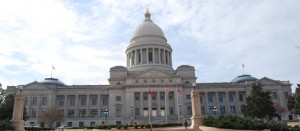 By Steve Brawner, © 2019 by Steve Brawner Communications, Inc.
By Steve Brawner, © 2019 by Steve Brawner Communications, Inc.
When people have a lengthy agenda to complete, they can start with the easier stuff or the harder stuff. The Arkansas Legislature this session understandably started with the easier stuff.
The easier stuff is cutting taxes. Gov. Asa Hutchinson is determined to cut Arkansas’ top rate to 5.9 percent so it won’t be the highest in the region. He says it sticks out like a sore thumb when he’s trying to recruit business and industry.
The hard part was working out the details and making sure the budget didn’t take too big a hit. Both pretty much have been accomplished. It still has to get through the House after passing the Senate, but while there still may be small hurdles to overcome, it eventually will happen.
The tax cuts are easier because the state has some extra money. That’s happened because policymakers here govern relatively responsibly – way more so than in Washington, D.C. – and the state is benefitting from a strong national and global economy and a seemingly generous federal government.
None of those should be seen as permanent realities, including the last two. We’re experiencing one of the longest economic expansions in modern memory, and what goes up will eventually level off. The Brits’ increasingly messy divorce from Europe is just one of many factors worldwide that could gum things up. If the global economy slows down, it will affect Arkansas.
Meanwhile, the federal government may not always be so generous. It is, after all, $22 trillion in debt.
One example of how that generosity could change: Republicans long have wanted to repeal the Affordable Care Act, otherwise known as Obamacare, and replace it with something else. Meanwhile, a Texas judge has ruled Obamacare unconstitutional. That ruling came in a lawsuit brought by a group of attorneys general that included Arkansas’ Leslie Rutledge. It’s under appeal.
If Obamacare’s opponents ever succeed in repealing it, there will be winners and losers, but one loser short term likely will be the state’s budget. Because Arkansas expanded its Medicaid population under the law, it has received billions of dollars from the federal government.
I’m not getting into what should happen with Obamacare here. I’m just telling you that all that money from Uncle Sam makes it easier for Arkansas lawmakers to cut taxes.
There were other reasons for tax cuts coming first – the most practical being that it helps to know what your revenues will be before you start spending. Still, this is a priority and it’s popular, and that’s what makes it easier.
Now it’s time for the harder stuff.
One moderately harder agenda item is the governor’s plan to reorganize state government. He wants to reduce the number of cabinet-level agencies from 42 to 15 and assign more than 200 independent boards and commissions to those departments. Legislators are discussing the bills that would make that happen, but so far they’re just talking, which isn’t too hard. Eventually those bills will be combined into one giant piece of legislation.
Any major change in government is challenging because too many people benefit from the status quo. But the governor’s transformation initiative will pass because he really wants it, because it makes too much sense, and because it will make government more efficient. The Department of Finance and Administration is guessing it will lead to $15 million in annual cost savings, but that estimate could be low.
Increasing highway funding, meanwhile, will be harder. That’s because it involves the always difficult tradeoff of actually paying more money for a wanted service. Nobody likes doing that. The Arkansas Department of Transportation has long complained of inadequate funding – it wants $400 million more each year – and now Hutchinson is on board, though probably not to that degree.
That kind of money can’t be found through surpluses and efficiencies. Either some other program could be cut, or legislators could raise taxes, or legislators could ask voters to approve a tax increase themselves.
Letting voters decide is the easiest of the three, which is why it’s probably the one that will happen. But it’s not easier than cutting taxes, which is one reason it’s coming later.
I’m skeptical on the $15 million in savings. If you read the transformation bills, several executive level positions / salaries are going to be added.